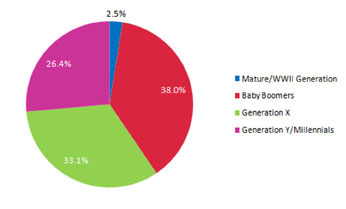Total Rewards: The Y of Performance Potential
By Karen Chalmers
According to an August 2005 study by Towers Perrin’s HR Services[i] a mere 14 per cent of employees are fully engaged on the job and are willing to “go the extra mile” for their employers. This amazing statistic emerged from the study that surveyed 85,000 people working for large and midsized companies in 16 countries on four continents. The study concluded that there is “a vast reserve of untapped employee performance potential that can drive better financial results, if companies can successfully tap into this reserve.”
As if this information is not cause enough for concern, managers must also consider the reality that the news could get worse as a new culture of employee bursts onto the employment scene. Whether you call the nearly nine-million Canadians born between 1981 and 2002 Gen Y-ers, Millenials, or Echo Boomers, the new generation is here. And, their perceptions and expectations must be understood if employers expect them to be productive, engaged workers.
Canadian Total Labour Force Participation by Select Generations[ii]
 While it isn’t fair to claim that nine-million Canadians think and act exactly alike, there are commonalities that have surfaced in many studies about the echo boomers. According to Connecting Generations: The Sourcebook by Claire Raines, the Millenials share these traits: “they’re sociable, optimistic, talented, well-educated, collaborative, open-minded, influential, and achievement-oriented. They’ve always felt sought after, needed, indispensable.”
While it isn’t fair to claim that nine-million Canadians think and act exactly alike, there are commonalities that have surfaced in many studies about the echo boomers. According to Connecting Generations: The Sourcebook by Claire Raines, the Millenials share these traits: “they’re sociable, optimistic, talented, well-educated, collaborative, open-minded, influential, and achievement-oriented. They’ve always felt sought after, needed, indispensable.”
This group of young people was raised to believe they had a voice and a choice in all factors of their lives as they were invited to participate in the decision-making process from the get-go. Good parenting and teaching meant repeated positive reinforcement and asking the little ones: “would you like cereal or toast, would you rather do spelling or math, do you want to wear the red shirt or the blue one?” It is no wonder that this generation has been nurtured from the beginning and expects to be told when they do things well.
They rely on the Internet for information, education, entertainment and socialization. Everything comes with instantaneous feedback… Instant Messaging offers total access to friends 24/7, online homework gives immediate answers, video games keep running scores and cell phones are a needed appendage.
Does it matter if employees are dissatisfied and disengaged?
The August 2005 Towers Perrin survey reports that “highly engaged workers believe they can and do contribute more directly to business results than do those employees who are less engaged.” Data showed:
- 84% of highly engaged employees believe they can positively impact the quality of their company’s products, compared with 31% of the disengaged
- 72% of the highly engaged believe they can positively affect customer service, versus 27% of the disengaged
- 68% of the highly engaged believe they can positively impact costs in their job or unit, versus 19% of the disengaged
The Towers Perrin study also revealed that highly engaged employees are also far less likely to leave for another job than their less engaged peers. Worldwide, 59% of the highly engaged survey respondents planned to stay with their current employer, compared with just 24% of the disengaged group.
What’s recognition got to do with it?
As study results show, a lack of recognition is a consistent job dissatisfier and a leading reason why employees don’t feel engaged. Employees report they need to feel both satisfied and engaged:
- A sense of self-worth from their work – employees want to feel confident and competent. Consistent, frequent recognition builds confidence and reassures employees that they are competent in their jobs.
- To have strong relationships with co-workers – employees want to feel a sense of community with their immediate work group. They want to be able to trust their co-workers and feel that their co-workers trust them in return. Workers want to hear from their peers and co-workers (not just their boss).
Further, the Gen Y worker wants to be involved in decision making. They are team players and collaborators and they want to know “why” and be able to give input and have their voice heard. In addition, the Millennial wants to know that (and how) they are making a contribution immediately. They have no concept or appreciation for “paying one’s dues” or “doing grunt work to advance.” They are used to winning, and desire recognition just for trying.
As studies show recognition is a critical factor in keeping employees engaged and thus contributing to an organization’s success. As employers look to the Reward and Recognition component of their Total Reward strategy, they would be wise to consider the changing expectations of the new Gen Y worker and focus on attracting, engaging and retaining a high performance culture.
Karen Chalmers is a member of BC HRMA, and is part of BI Worldwide, Canada. For nearly 60 years BI Worldwide has been working with organizations to improve the performance of the people who impact their business. BI helps increase revenue, heighten productivity and decrease costs. If you don’t move your people, you can’t move your company. With the Canadian head office based in Vancouver, BC, BI has approximately 800 associates in over 25 global offices. For more information please visit www.biworldwide.ca or contact Karen directly on 778-373-1503







